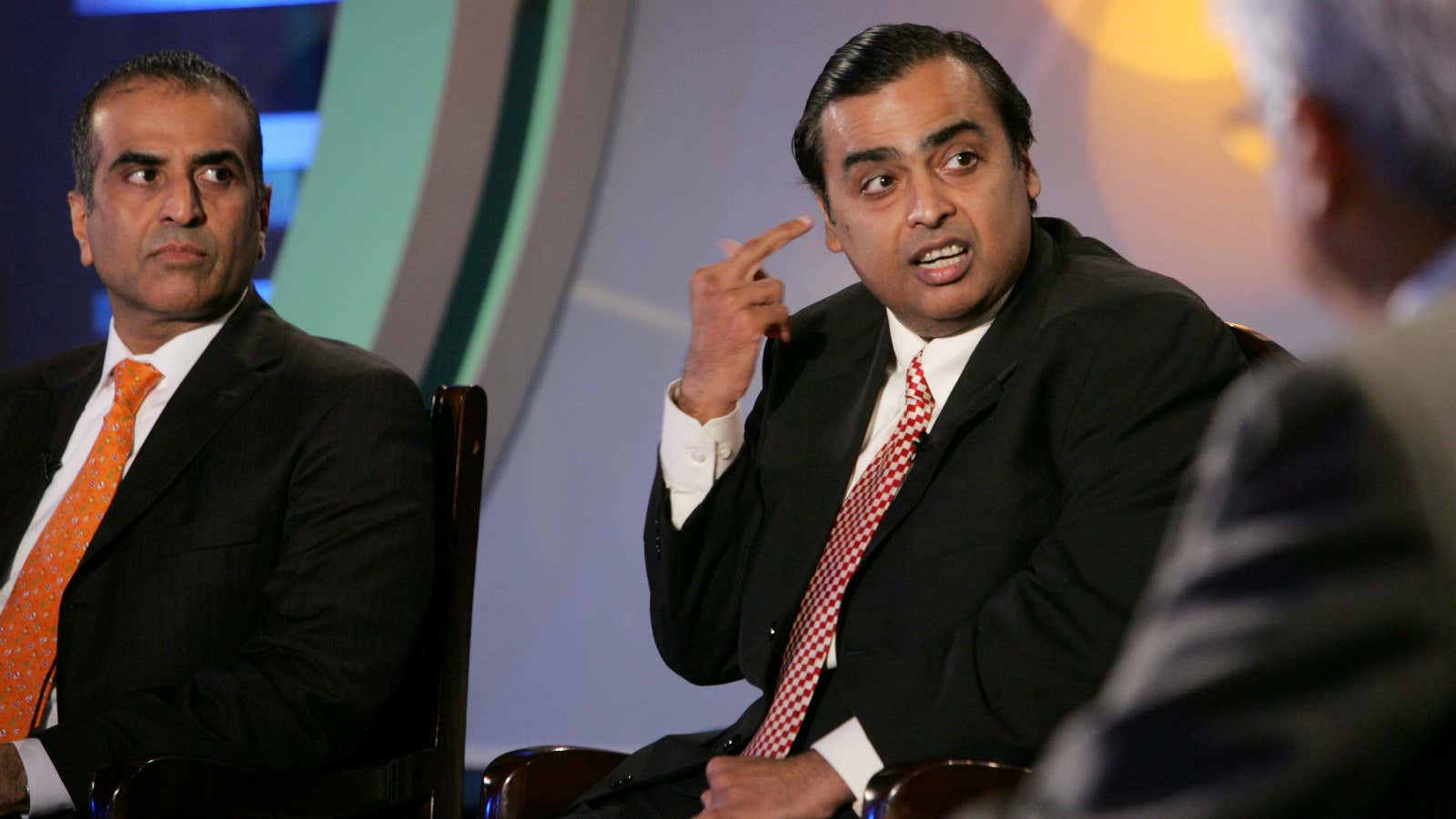There is an ugly spat underway in India’s $50-billion telecommunication industry.
Barely a fortnight after India’s richest man, Mukesh Ambani, launched his much-awaited 4G service, Reliance Jio, the newcomer is already embroiled in a war of words with India’s biggest telecom company, Bharti Airtel. The conflict is over providing points of interconnect. These points help link networks so consumers can make calls between different operators, enabling a smooth exchange of traffic. Each company claims the other isn’t coordinating and has ulterior motives.
The sparring isn’t entirely unexpected. Jio is being touted as an industry disrupter for its ridiculously low data prices ($0.7 per gigabyte), expansive infrastructure, and plan to entirely do away with charges for domestic calls.
So, even before it was formally launched, incumbent players were on the edge.
For instance, in August, these telecom providers complained to the Telecom Regulatory Authority of India (TRAI) that Jio was offering full-fledged services to customers and calling it trials, even before the services began. Ambani refuted these allegations.
Then, a week before Jio’s launch, Bharti Airtel, Vodafone, and Idea Cellular—these three control 60% of the market currently—slashed their prices for data services to keep up with Jio’s anticipated lower rates.
Now, it has degenerated into an unseemly and public squabble between Jio and Bharti Airtel. Here’s how it all happened, based on media statements from companies:
- Sept. 17: In a statement, Airtel said it has received a payment from Jio to provide extra interconnect points to facilitate the large call volume that the latter is expecting. According to the interconnectivity agreements, these points should be provided within 90 days of receiving the payment, Airtel said, but it “would work towards releasing the points of interconnect well ahead of the contractual obligation.”
- Sept. 18: In a statement (pdf), Jio said no such 90-day clause exists and that TRAI has “instructed the incumbent operators to urgently provide requisite interconnection capacities to maintain the quality of service parameters and not to make this subject to any contingencies or restrictions.”
- In the same statement, Jio also said that Airtel hadn’t provided enough interconnect points, as a result of which more than 20 million calls between the two networks’ subscribers fail daily. It said Airtel is “dilly dallying” on adequate points to Jio.
- Sept 18: Airtel issued a statement following Jio’s allegations. “…it is Jio that seems to be dilly-dallying on the issue and not cooperating deliberately. It appears that the constant rhetoric may be a ploy by Jio to cover up some technical issues in their own network, which is causing call failures, by constantly blaming other operators,” the statement said.
- Sept 18: Late on Sunday, Jio replied to Airtel’s allegation. “The statements from Airtel are misleading and unfortunate in the context of the severe quality of service issues being faced by the Indian customers. While there are over two crore call failures every day between the two networks, there are no incidents of call failures within the Jio network.”
Jio disrupt
Telecom firms, especially Airtel, have a reason to be jittery over Jio’s plans.
The Ambani company has set a target of getting 100 million customers on board by December 2016. It’s quite a target considering that Airtel, which launched in 1995, has some 358 million users after 20 years.
“Bharti and Idea would be impacted by the aggressive signing up of subscribers by Jio—likely as second SIM—on account of the welcome offer and it can potentially shift voice/data usage from incumbents,” analysts at ICICI Securities, a brokerage, said in a Sept. 02 report.
Then there’s Jio’s huge network capacity. In a report on Sept. 14, analysts at Credit Suisse explained how Jio’s huge network capacity—three times that of Airtel—will make it a powerhouse when it comes to pricing.
Other competitors
As Bharti Airtel and Reliance Jio have a go at each other, Vodafone India and Idea Cellular have been quietly ramping up their points of interconnect for Jio over the past few days.
Jio had earlier said that Vodafone and Idea did not provide enough of such points despite frequent requests. It also said that of every 100 calls made to the Vodafone networks, 80 were failing.
“Following guidance from TRAI and clarifications from Jio regarding its commercial launch, Vodafone India has decided to increase the points of interconnect between the two operators by thrice and accordingly increase the capacity to connect,” Vodafone said in a statement on Friday (Sept. 16).
Over the next few weeks, the issue could be sorted out, but there is an even bigger war looming: the impending spectrum allocation by the government.
Jio has already offered the highest earnest money deposit (EMD), indicative of its plans for the upcoming auctions. It means the company is eligible to bid in any of the country’s 22 telecom circles and in any spectrum band. It is also the first time that the 700 Mhz band—considered the best for 4G operations—is being auctioned. And Jio, with the highest EMD, is the only company with the potential to buy spectrum at a base price in most of the circles.
The competition, in all likelihood, will not be pleased. Prepare for Round 2.
